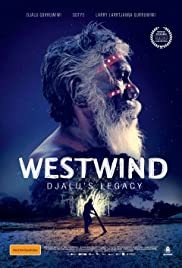
WESTWIND: DJALU’S LEGACY
Australia, 2017, 86 minutes, Colour.
Djalu Gurruwiwi, Larry Gurruwiwi....
Directed by Ben Strunin.
At the same time as there was the documentary, Gurrumul, the life of the famed Arnhem land musician and singer, Geoffrey Gurrumul Unupingu.there was this documentary, also from Arnhem Land, about another musician, Djalu Gurruwiwi and his son, Larry.
One of the main breakthroughs for the indigenous people of Australia is in the field of music, song and dance. This film also has a focus on the indigenous musical instrument, the didgeridoo.
It comes as something of a surprise to find that Djalu has been on several international tours over the years and is seen in this film playing in Florence, in Paris, at the British library in London.
Djalu is an elder, taught by his father, attempting to hand over the traditions to his son. However, the son, who at times was a significant footballer, was not so much interested in what his father had to offer but, rather, started his own band, leading it as a popular singer. In later years, there is much more rapport between father and son.
The screenplay offers a lot of information about the tradition of song lines, aboriginal myths – dramatised by a very colourful animation of the rainbow serpent moving through the countryside. Djalu’s wife, sister and other relations provide the talking heads and the comments about the importance of song lines and the holding on to language and traditions.
Djalu is also the maker of didgeridoos. There is a lot of information and visual presentation of the finding of the trees, the chopping down of the trees, the hollowing of the trees, the planing of the surfaces, the range of instruments and the quality of the sounds of the didgeridoo.
The contemporary singers and musicians, Larry and Gottye, visit Arnhem land and they share the musical experiences, the playing of the didgeridoo, the lyrics of songs, their combining in singing the songs. It is a humane meeting of minds and hearts, between Blacks and Whites, through music. And this culminates with the group performing to an enthusiastic audience at the Adelaide music Festival, Womade.
This is a film for the indigenous people to be proud of, Djalu and his talent and achievement. This is a film for the latecomers to the land to see and to appreciate the mythical and music traditions that were here before them.
1. Australian perspective? Indigenous Australians? 20th 21st-centuries?
2. Music to the world, Songlines, myths, preservation of traditions, handing them on, the next generations, the danger of losing the myths?
3. The title, the visual images of the wind in nature? The animation? Indigenous myths? The presence of the Rainbow Serpent pervading the land? The animation for the characters and narratives?
4. The location photography, Arnhem Land, the island, the homes, the modern aspects of the town, interiors of the houses, the bauxite mine? The radio station? The contrast with the visits and performances in Florence, in France, the British Museum in London?
5. The importance of the music, Djalu and his skills? Performance? Larry, moving to more modern music? The combination of the old and the new? His band? His instruments?
6. The importance of the didgeridoo, the felling of the trees, the hollowing of the trees, cleaning and smoothing? Testing? The sound, chant, dance?
7. The character of Djalu, when young, his relationship with his father, receiving the traditions? The inclusion of contemporary footage of the period? Growing up, learning the instrument, playing? The importance of the tours?
8. Djalu, his attitude towards white Australians, the memories of the past, 1788 onwards? Dialogue? Shared music? Reconciliation? As a character?
9. Larry, his story, playing football, being suspended, music, not being ready for the didgeridoo, development over the years, establishing his band?
10. The singer and his friends, coming to Arnhem Land, sharing the experience, the friendship, learning the instruments, learning the language for the songs, singing?
Performance? The climaxing going to Adelaide, Womade, the explanations, the performances, the audiences?
11. The range of talking heads, providing the background? Djalu and Larry? Djalu’s daughter, his wife, his sister?
12. The importance of language, indigenous languages? People speaking English? Taking English for granted – the use of subtitles for the cinema audience?
13. 2017, deaths, funeral, the place of aborigines in Northern Territory society? The difficulties with youth, smoking weed, alcohol? School, the children? Yet modernity, the iPhones and pads, the technology, phones and photos? The challenge?
14. The experience of sharing Djalu’s life and experiences and his music? And his attitude?